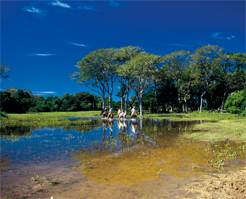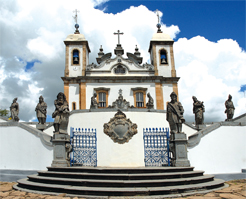Brazil Travel Guide



Telephone:
E:
Area
With an area of 3.3 million square miles (8.5 million square km) and a coastline of 4,500 miles (7,250 km), Brazil is the world’s fifth largest country. It is larger than Europe or the continental USA.
Buses
Despite the distances involved, it is possible to travel from Brazil to another country by bus. The journey to Buenos Aires from Rio de Janeiro, for example, takes 44 hours and covers 1,800 miles (2,900 km). Domestically there is an extensive internal bus service linking all the main Brazilian cities. While this is an inexpensive way to view the country, distances can be considerable.
Car Rental
Most of the big international car rental companies operate in the major cities alongside local companies. All that is required for you to drive in Brazil is a full valid British or European driving licence.
Climate
90% of Brazil is within the tropics. Rio, Recife, Natal, Fortaleza and Salvador on the coast have the warmest climate that is balanced by the Trade Winds. Rio, for example, has an average temperature of around 26°C (80°F) that climbs into the high 30s-low 40s (over 100°F) during the summer months. Plateau cities such as São Paulo, Brasília and Belo Horizonte have milder climates averaging 19°C (66°F). In southern Brazil the climate is similar to parts of Europe, with frosts occurring in the winter months (July-August). Summers are hot. In Brazil the seasons are the reverse of those in the UK so summer runs from 22 December to 21 March.
Cruise Ships
Brazil is one of the main areas of the world for cruising and Rio is a prime port of call. Other popular ports include Manaus, Belém, Fortaleza, Recife, Salvador and Vitória.
Customs & Immigration
At the airport visitors will have their passport and visa (if required) checked. Brazilian airports have separate lines on arrival for Brazilian passport holders and foreign visitors.
Diving
The Brazilian coast has many exceptional dive sites. Locations rated among the best include the archipelago of Fernando de Noronha; the coast of Pernambuco; and the marine park of Abrolhos off the southern coast of Bahia.
Dress
Brazilians dress casually outside of the office. None of the top restaurants insist on collar and tie, although the occasional private business club may. Collar and tie still predominate in formal office and business surroundings in São Paulo, Rio and Brasília.
Drink
The legal age to purchase alcoholic beverages in Brazil is 18. Brazil produces or imports most of the major international brands. Beer is a light lager that is served in draught form or bottled. The national drink is cachaça, made from crushed sugar cane, which is the basis of a caipirinha. Brazil is the world’s largest coffee producer.
Duty Free
Brazil’s international airports offer duty free goods on arrival and visitors, are allowed to purchase up to US$500 worth of duty free products, including drink and tobacco.
Eating Out
Brazil offers a huge diversity of culinary styles and influences including a wide regional variety, most notably those of Bahia and Minas Gerais. There is a clear influence in the cuisine of Brazil of its earliest discoverers, the Portuguese along with the French, Spanish and Dutch. West African influences are also prevalent, especially in the cuisine of the Northeast. More recent immigrants have also had a say on how Brazil eats, especially those from Italy, Germany and Japan.
Electrical Current
In Rio and São Paulo, the current is 127 volts (60 cycles) but many of the larger hotels offer 220 volts. If there is any doubt, check with the hotel. Not all of Brazil is 127 volts, for example Recife and Brasília are 220 volts.
Guide Books
Most of the major guidebook series publish titles that cover Brazil. Many also produce a separate guide for Rio.
Health & Insurance
Brazil has a very good network of private hospitals in the major metropolitan areas. Private medical care is expensive so we advise you to take out medical and travel insurance.
Language
Portuguese is the language of Brazil. Spanish and English are the most widely understood foreign languages.
Media
There are no locally published English language newspapers in Brazil, but foreign newspapers and magazines are not difficult to find in Rio and São Paulo. Hotels have satellite or cable television offering original language programming from the US and Europe, including the main news channels.
Money, Banks & Credit Cards
The Brazilian monetary unit is the real, (plural, reais). There are 100 centavos (C) to the real (R$). The official exchange rate is published daily in the newspapers.
The US dollar and Euro are the most widely accepted foreign currencies but in the main cities there is little problem in changing pounds. There is an extensive network of ATMs at which you can use your cash or credit cards to withdraw reais. Most major international credit cards are accepted in Brazil, especially MasterCard and Visa.
Population
Brazil has a population of approximately 190 million, making it the world’s fifth most populous nation. There are 15 cities in Brazil with a population of over one million, of which São Paulo is the largest and Rio is second.
Public Holidays
As well as the public holidays listed, individual states and cities also have their own separate
holidays. National Holidays include:
• 1 January: New Year’s Day
• February/March: Carnival
• March/April: Good Friday (Tiradentes)
• 1 May: Labour Day (Corpus Christi)
• 7 September: Independence Day
• 12 October: Our Lady of Aparecida
• 2 November: All Souls Day
• 15 November: Proclamation of the Republic
• 25 December: Christmas Day
Railways
Brazil has only 17,500 miles of railways compared to over one million miles of roads. The passenger rail network in Brazil is very limited and not a viable option for travelling around the country. There are, however, a number of special scenic routes.
Taxis
Taxis in Brazil are cheap compared to the UK and easy to find in all the major cities.
Telephone Services
Brazil has a well-developed telephone network and it is possible to direct dial to anywhere in Brazil or internationally. The country has one of the largest mobile phone networks and your British mobile phone should work if it is tri or quad band. Check with your mobile company prior to travelling.
Time
The time in the areas of Brazil most popular with visitors is generally three hours behind Greenwich Mean Time. This is true of Rio, São Paulo, Brasília, Bahia, Minas Gerais, etc. Brazilian “summer time” runs from October until mid-February. During this period, clocks in Brazil go forward one hour in most of the southeast.
Vaccinations
An international certificate of vaccination against polio is compulsory for children aged between three months and six years. An international certificate of vaccination against yellow fever is compulsory for travellers who, within the three months prior to their arrival in Brazil, have visited or been in transit through certain infected countries.
Additionally, vaccination against yellow fever is recommended for travellers when visiting the states of Acre, Amazonas, Amapá, Distrito Federal, Goiás, Maranhão, Minas Gerais, Mato Grosso do Sul, Mato Grosso, Pará, Rondônia, Roraima, and Tocantins. If there is any doubt about your need for a vaccination we will contact the Brazilian Consulate to check for the latest recommendations.
Visas
UK and EU passport holders do not require a visa to enter Brazil. Passports must be valid for at least six months and a return ticket and proof of sufficient funds may be requested on arrival. You will be admitted in to Brazil for a stay of up to 90 days that can be extended, at the discretion of the Federal Police, for a further 90 days. If you are not travelling on a European passport, please check with us if you will need a visa. For example, Australian, Canadian and US passport holders do. You can check the very latest visa information on the Brazilian consulate website.
